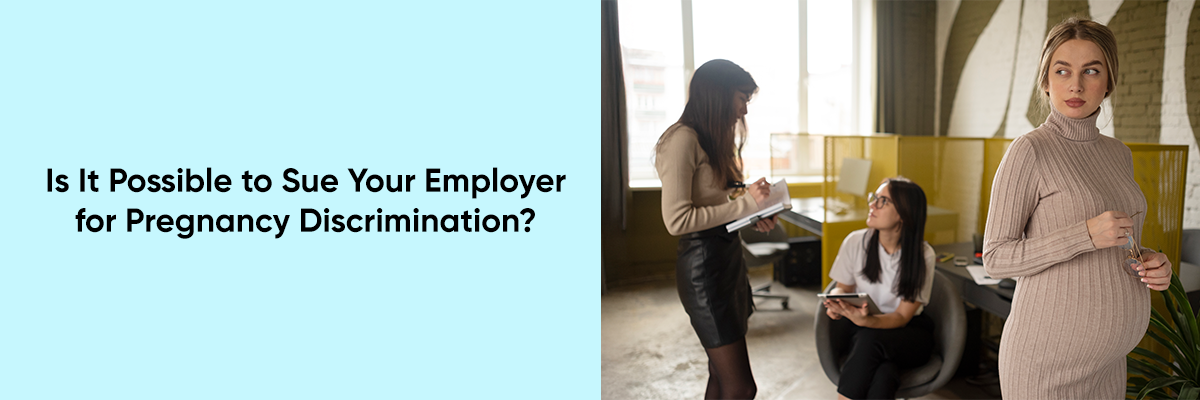Pregnancy is a special time, but unfortunately, some women face workplace discrimination during this period. If you’re experiencing unfair treatment due to pregnancy, you might wonder if you have any legal options. Can you sue your employer for pregnancy discrimination? The answer is yes. In many countries, laws protect employees from discrimination, including pregnancy-related issues.
Here’s what you need to know about your rights, how to recognize discrimination, and the steps you can take if you decide to sue your employer.



Understanding Pregnancy Discrimination
Pregnancy discrimination happens when an employer treats an employee unfavorably because of pregnancy, childbirth, or medical conditions related to pregnancy. This can include actions such as:
- Job loss or demotion after announcing a pregnancy.
- Denial of promotion or advancement opportunities.
- Refusal to provide necessary accommodations, like more bathroom breaks or temporary adjustments to workload.
- Reduced pay or fewer hours based solely on pregnancy.
When employers take these actions, they violate several laws intended to protect employees’ rights.
Legal Protections Against Pregnancy Discrimination
Various laws have been enacted to protect employees from pregnancy discrimination. In the United States, the Pregnancy Discrimination Act (PDA) is a key piece of legislation. It prohibits employers from discriminating against employees or job applicants based on pregnancy, childbirth, or related conditions. This law applies to companies with 15 or more employees and ensures that pregnant employees are treated fairly and equally.
Additionally, the Family and Medical Leave Act (FMLA) provides certain employees with up to 12 weeks of unpaid, job-protected leave per year for specified family and medical reasons, including pregnancy and childbirth. Many states also have their own laws that provide further protections or requirements for employers.
If you work outside the United States, your country may have similar protections. For example, the Equality Act 2010 in the UK covers pregnancy discrimination. Other countries also have legal frameworks that prohibit workplace discrimination based on pregnancy.
Pregnant workers can also make sure of being treated fairly when it comes to reasonable accommodation through the Pregnant Workers Fairness Act.
Identifying Pregnancy Discrimination
If you believe you’re being discriminated against, you may wonder how to recognize it. Here are a few signs:
- Unjustified negative evaluations or performance reviews soon after revealing your pregnancy.
- Unwarranted pressure to take early leave or return quickly after maternity leave.
- Unreasonable denial of work accommodations that were previously available, like flexible work hours.
- Exclusion from important projects or meetings that you would typically be involved in.
Discrimination can sometimes be subtle, but if your working conditions or treatment change significantly after sharing news of your pregnancy, it’s essential to investigate further.
Steps to Take If You Experience Pregnancy Discrimination
If you suspect pregnancy discrimination, there are steps you can take to address it. Acting promptly and following these steps can improve your chances of a successful resolution.
- Document Everything
Keep a record of any discriminatory actions. This may include emails, text messages, written warnings, or evaluations that seem to change after your pregnancy announcement. Having concrete evidence can be crucial if you decide to pursue a legal case. - Know Your Rights
Research the laws in your area that protect against pregnancy discrimination. If you’re in the U.S., understanding the Pregnancy Discrimination Act and the Family and Medical Leave Act will help you navigate your options. Familiarize yourself with your company’s policies, too; many companies have specific guidelines for pregnancy-related accommodations. - Talk to HR
If you’re comfortable, bring your concerns to your Human Resources (HR) department. They are often equipped to handle issues like discrimination and may be able to mediate. HR is obligated to investigate claims of discrimination and work with both you and your employer to resolve the situation. However, if HR fails to address the issue or doesn’t take it seriously, you may need to escalate matters. - File a Complaint
In the U.S., you can file a complaint with the Equal Employment Opportunity Commission (EEOC) if you believe you’ve been discriminated against due to pregnancy. The EEOC will investigate your claim, and if they find evidence of discrimination, they may take legal action on your behalf. In case you have an EEOC claim filed against your company, you can check out things you can do to reduce charges of EEOC discrimination. Similarly, many countries have organizations or commissions where employees can file discrimination complaints. - Consider Legal Action
If other options fail, you may decide to sue your employer. Hiring an employment attorney who specializes in discrimination cases can be a good next step. They will help you gather evidence, file your case, and navigate the legal process. An attorney will also advise you on the strength of your case and the potential outcomes.
Final Thoughts
Pregnancy discrimination is not only unfair but also illegal. If you’re experiencing it at work, know that you have rights and resources to protect you. Taking steps like documenting incidents, reporting the issue to HR, and considering legal action can help ensure that you’re treated fairly. Laws are in place to support you, and with the right approach, you can take action to safeguard your career and wellbeing.
Remember, the goal of these laws is not just to prevent discrimination against you, but to promote a workplace culture that respects all employees and treats them equitably, regardless of their pregnancy status. Standing up for your rights can be challenging, but knowing the steps and resources available to you can make it a little easier.


